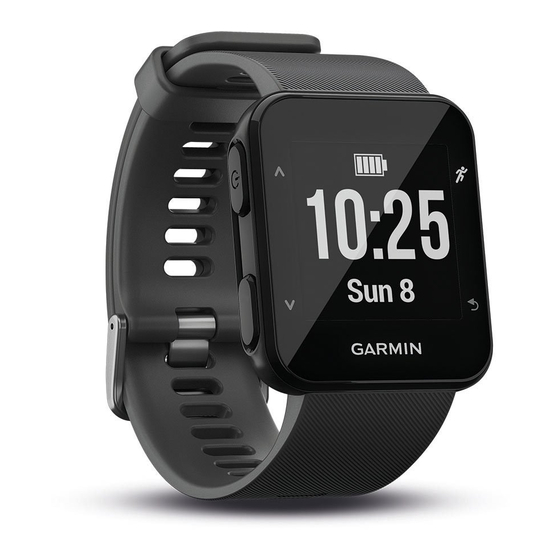Garmin Forerunner 30 Manuale d'uso - Pagina 6
Sfoglia online o scarica il pdf Manuale d'uso per Attrezzatura marina Garmin Forerunner 30. Garmin Forerunner 30 14. Garmin sl 30 aviation-nav/comm: release note
Anche per Garmin Forerunner 30: Manuale d'uso (38 pagine), Nota di rilascio (2 pagine)

Using the Auto Pause
You can use the Auto Pause feature to pause the timer
automatically when you stop moving. This feature is helpful if
your activity includes stop lights or other places where you need
to stop.
NOTE: History is not recorded while the timer is stopped or
paused.
Select
> Settings > Activity Options > Auto Pause.
NOTE: The Auto Pause feature is available when the device
detects running or cycling activities.
Marking Laps by Distance
You can use the Auto Lap
®
every 1 mi. or 1 km. This feature is helpful for comparing your
performance over different parts of a run.
Select
> Settings > Activity Options > Laps > Auto
Lap.
Each time you complete a lap, a message appears that displays
the time for that lap. The device also beeps or vibrates if audible
tones are turned on
(Setting the Device Sounds, page
If necessary, you can customize the data screens in your
Garmin Connect account to display additional lap data.
Turning on the Lap Key
You can customize
to function as a lap key during timed
activities.
Select
> Settings > Activity Options > Laps > Lap Key.
Activity Tracking and Other Widgets
You can select
or
to view your heart rate, steps for the day,
and additional widgets. Some features require a Bluetooth
connection to a compatible smartphone.
Time of day: Displays the current time and date. The time and
date are set automatically when the device acquires satellite
signals and when you sync your device with a smartphone.
The move bar displays the amount of time you are inactive.
Heart rate: Displays your current heart rate in beats per minute
(bpm) and your seven-day, average resting heart rate.
Notifications: Alerts you to call and text notifications from your
smartphone.
Activity tracking: Tracks your daily step count, progress toward
your goal, and distance traveled. The device learns and
proposes a new step goal for you each day. You can
customize goals using your Garmin Connect account. For
more information about activity tracking accuracy, go to
http://garmin.com/ataccuracy.
Calories: Displays the total amount of calories burned for the
current day, including both active and resting calories.
Intensity minutes: Tracks your time spent participating in
moderate to vigorous intensity activities, your weekly intensity
minutes goal, and your progress toward your goal.
Last activity: Displays a brief summary of your last recorded
activity. You can select
Icons
Icons represent different device features. Some features require
a paired smartphone.
Your current heart rate in beats per minute (bpm) and your seven-
day, average resting heart rate.
A flashing icon means the device is acquiring your heart rate
data. A solid icon means the device is locked on to your heart
rate.
Smartphone is connected to the device.
Notifications received from a paired smartphone.
2
Feature
®
feature to automatically mark a lap
to view recent activity history.
The total number of steps taken for the day, your step goal for the
day, and your progress toward your goal.
Alarm is on.
The total calories burned for the current day, including both active
and resting calories.
Your time spent participating in moderate to vigorous intensity
activities, your weekly intensity minutes goal, and your progress
toward your goal.
Auto Goal
Your device creates a daily step goal automatically, based on
your previous activity levels. As you move during the day, the
device shows your progress toward your daily goal
5).
If you choose not to use the auto goal feature, you can set a
personalized step goal on your Garmin Connect account.
Move Bar
Sitting for prolonged periods of time can trigger undesirable
metabolic state changes. The move bar reminds you to keep
moving. After one hour of inactivity, the move bar
Additional segments
inactivity.
®
You can reset the move bar by walking a short distance.
Intensity Minutes
To improve your health, organizations such as the U.S. Centers
for Disease Control and Prevention, the American Heart
Association
, and the World Health Organization, recommend at
®
least 150 minutes per week of moderate intensity activity, such
as brisk walking, or 75 minutes per week of vigorous intensity
activity, such as running.
The device monitors your activity intensity and tracks your time
spent participating in moderate to vigorous intensity activities
(heart rate data is required to quantify vigorous intensity). You
can work toward achieving your weekly intensity minutes goal by
participating in at least 10 consecutive minutes of moderate to
vigorous intensity activities. The device adds the amount of
moderate activity minutes with the amount of vigorous activity
minutes. Your total vigorous intensity minutes are doubled when
added.
Earning Intensity Minutes
Your Forerunner device calculates intensity minutes by
comparing your heart rate data to your average resting heart
rate. If heart rate is turned off, the device calculates moderate
intensity minutes by analyzing your steps per minute.
• Start a timed activity for the most accurate calculation of
intensity minutes.
appear after every 15 minutes of
.
appears.
Training
